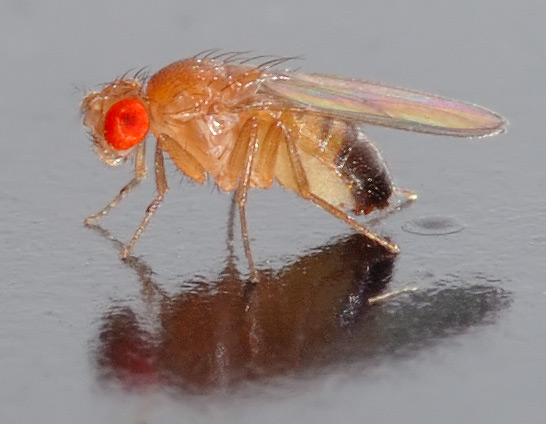 |
Laurence Cawley (BBC News) wrote a piece for the BBC website called Seven of the more unusual areas of university research. It makes for some interesting reading and does provoke the question about financially sustaining research in UK universities. |
However there is one clear mistake here. The work of Dr Barry Denholm at Cambridge is good science clearly motivated by medicine. Denholm studies cells called nephrocytes found in the excrement of flies and these cells are very similar to podocyte cells found in our kidneys.

Drosophila melanogaster, or common fruit fly.
Fruit flies have been used for a while now as a model organism as they are easy to care for and breed quickly. They give us way to preform experiments when it would be unfeasible or unethical to preform the experiment on a human.
The hope is, that due to the similarities of the certain cells found in flies and humans, kidney research could be conducted much quicker and cheaper than today. In particular studying the roles of genes in kidney disease becomes much easier.
The potential benefits to mankind are clear.
I will let other people defend the remaining six…
Couldn’t agree more. It is not acceptable to lump Drosophila research alongside PhD studies in the ‘history of shoes’. Drosophila melanogaster is, as you say, a model organism in Biology, the study of which sheds light on matters of importance to Medicine. The ‘history of shoes’ has impact on… whom? A bunch of anoraks without girlfriends probably.
Tattoo history is pretty interesting, and I’m glad that there is someone studying it. Should it be publicly funded? I don’t know.
Academic lap dancing and body building is harder to justify. Literature, whatever the topic, vampires or whatever, has and always will be studied academically…where people write books about other people’s books. Why not? Is literature there to be enjoyed or rigorously studied? Who am I to say, I read P G Wodehouse and Douglas Adams.
It seems to me that the author is buying into the “research has to be applied with immediate benefit” push so favored by (current) politicians. Considering that in order to discredit ongoing research the author had to stretch quite a bit, it appears to be a failing tactic. In addition, I do not see how the other examples of social sciences should be considered very odd.
Sure, they are not natural science question (with the potential exception of the cow study), but who says that they are not relevant?
The history of shoes out of context may appear weird, but it could be actually shed light in certain aspects of human history. The history of beverages could be framed in a very silly light, but it has deep cultural aspects.
Whether this is also the case with the history of shoes, I do not know without at least reading a few books on the subject matter, but assuming that the research was properly done, I do not see really anything ridiculous on it. We can learn things from the oddest of places, if we do things properly (and actually, I think that the fruit fly is pretty much a case in point).